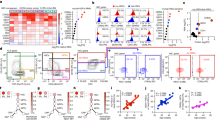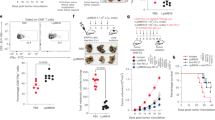Abstract
SINCE Metchnikoff (quoted in ref. 1) showed that amoebocytes, the circulating cells in invertebrates, are capable of phagocytosis1, it has become increasingly apparent that they have various immunological functions. For example, amoebocytes mediate resistance to infection2,3 and rejection of xenogeneic grafts4,5.
This is a preview of subscription content, access via your institution
Access options
Subscribe to this journal
Receive 51 print issues and online access
$199.00 per year
only $3.90 per issue
Buy this article
- Purchase on Springer Link
- Instant access to full article PDF
Prices may be subject to local taxes which are calculated during checkout
Similar content being viewed by others
References
Lectures on the comparative pathology of inflammation, (Trench, Tribner and Co., London, 1883).
Bang, F. B., and Lemma, A., J. Insect Path., 4, 401 (1962).
Bang, F. B., J. Reticuloendothelial Soc., 7, 161 (1970).
Hostetter, R., and Cooper, E., J. Immun., 9, 384 (1973).
Ghiradella, H. T., Bio. Bull., 128, 77 (1965).
Reinisch, C. L., and Bang, F. B., Cell. Immun., 2, 496 (1971).
Prendergast, R. A., Cole, G. A., and Henney, C. S., Ann. N.Y. Acad. Sci. (in the press).
Author information
Authors and Affiliations
Rights and permissions
About this article
Cite this article
REINISCH, C. Phylogenetic origin of xenogeneic recognition. Nature 250, 349–350 (1974). https://doi.org/10.1038/250349a0
Received:
Revised:
Issue Date:
DOI: https://doi.org/10.1038/250349a0
This article is cited by
-
Cellular Responses of Congenital Immunity in the Starfish Asterias rubens
Journal of Evolutionary Biochemistry and Physiology (2005)
Comments
By submitting a comment you agree to abide by our Terms and Community Guidelines. If you find something abusive or that does not comply with our terms or guidelines please flag it as inappropriate.



